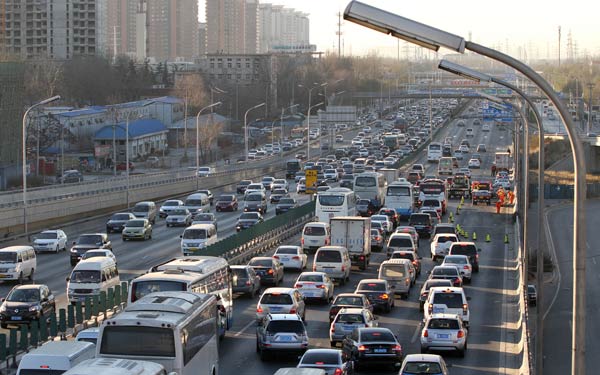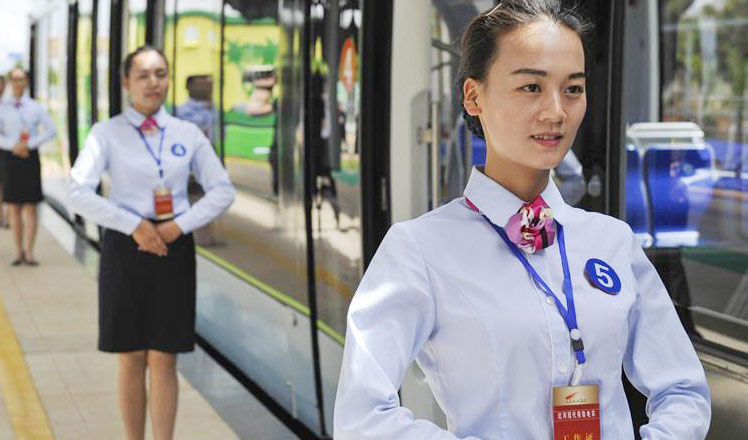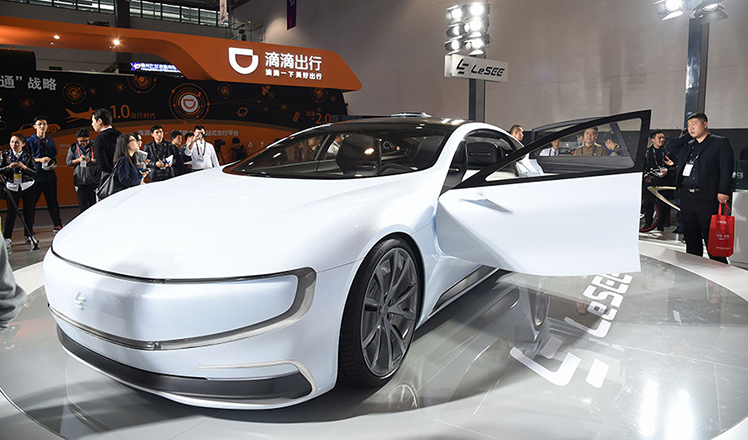Beijing finalizes preliminarily work on congestion charge
Updated: 2016-05-27 12:24
By Liu Wei(chinadaily.com.cn)
|
||||||||
 |
|
The Fourth Ring Road in Beijing in a morning rush hour. City authorities are working on solutions to ease the pressures on traffic in the city. [Photo/China Daily] |
Beijing has preliminarily worked out policies on congestion charge for vehicles, reported National Business Daily on Friday.
Beijing Municipal Environmental Protection Bureau and Beijing Municipal Commission of Transport confirmed that research was conducted to test the policies on Thursday.
The policy has been formulated on a base of the similar experience in Singapore, London and Stockholm.
The congestion charge policy is to discourage the use of vehicles, especially in rush hour and congested traffic, for the purpose of easing the traffic and the environmental pollution due to excess gas emission.
According to data, there are more than 5.6 million cars in Beijing and annual discharge of pollutants is about 700,000 tons, said National Business Daily.
One third of the total emission is the vehicle emission, the biggest cause of local pollutants, According to the analysis on PM2.5 in Beijing in 2014.
Beijing has been bringing up and discussing the congestion charge several times since 2013. Authorities discussed the issue in 2010 and 2013 but did not take action.
Currently, no city in China charges a congestion fee.
Wu Hongyang, deputy chief of urban transportation research center in Ministry of Transport, said once Beijing started carry out congestion charge policy, other cities and regions will follow the example.
The commission of transport for the city announced in Dec, 2015 a series of efforts to ease traffic pressures, including a pilot plan to collect a congestion fee, impose restrictions on the use and purchase of vehicles and to promote environmentally conscious traveling. There are more than 21 million people and 5 million vehicles in Beijing.
The measures will be implemented over the course of the city's five-year plan.
- Camps abroad offer students a new experience
- China-made world's first functional 3D printed building opens in Dubai
- Map reveals claim over islands by Manila groundless
- Racial sensitivity urged as ad causes outrage
- Regulator to launch drug pricing probe
- What is that thing? Innovative bus looks like a moving tunnel
- Chinese G20 presidency 'ambitious' in seeking solutions for global growth: OECD official
- UNICEF alarmed at refugee, migrant deaths in Mediterranean
- 35% of northern and central Great Barrier Reef destroyed
- Vintage plane crashed in Hudson River during emergency landing
- 2,000 refugees relocated on first day of major police operation
- No sign of EgyptAir plane technical problems before takeoff

 Graduation ceremony held in Confucius Temple
Graduation ceremony held in Confucius Temple
 Wanda opens theme park to rival Disney
Wanda opens theme park to rival Disney
 Fog turns Qingdao city into a fairyland
Fog turns Qingdao city into a fairyland
 Trams to be in trial use in SW China
Trams to be in trial use in SW China
 children's Day: From cooking meal to catwalk
children's Day: From cooking meal to catwalk
 Beijing style: People embrace the summer heat
Beijing style: People embrace the summer heat
 Ten photos from around China: May 21-27
Ten photos from around China: May 21-27
 VR, robots, mini drones: Highlights of big data expo in Guiyang
VR, robots, mini drones: Highlights of big data expo in Guiyang
Most Viewed
Editor's Picks

|

|

|

|

|

|
Today's Top News
Liang avoids jail in shooting death
China's finance minister addresses ratings downgrade
Duke alumni visit Chinese Embassy
Marriott unlikely to top Anbang offer for Starwood: Observers
Chinese biopharma debuts on Nasdaq
What ends Jeb Bush's White House hopes
Investigation for Nicolas's campaign
Will US-ASEAN meeting be good for region?
US Weekly

|

|





